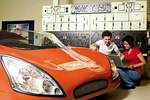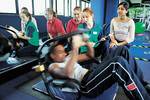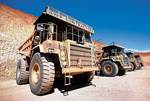Engineering a renaissance in Adelaide
Major new developments are on the horizon for engineering at the University of Adelaide, with potential students set to benefit from the changes, as ROBYN MILLS reports. Engineering is undergoing a renaissance at the University of Adelaide fuelled by the high demand for skilled graduates and exciting new areas of study. Two new programs - Mining Engineering and Pharmaceutical Engineering - recruited above expectation this year and another six new bachelor degree programs are in the pipeline. A bid has gone in for 200 new Commonwealth-supported student places starting in 2008, on top of the extra 100 places filled this year. The University recently announced a $100 million new building to cater for the significant growth. Leading this rapid development is Professor Peter Dowd, Executive Dean of the University's Faculty of Engineering, Computer and Mathematical Sciences. Professor Dowd explained the increasing demand: "The first major reason is that there is a booming economy at the moment and a serious skills shortage in areas such as resources, manufacturing and processing - all areas which require engineers. There is a very clear link between an engineering degree and an exciting, well-paid career, and that means it is an attractive study option. "There is also another more fundamental reason. Everything we do is moving towards what an engineer would call a systems approach to things. The idea of a system is to look at the total problem, and look at how the component you're interested in interacts with everything else, how it affects the wider picture. That concept - systems engineering - has meant the introduction of whole new areas of study emerging at the interface between disciplines, for example biology and engineering." The new Pharmaceutical Engineering degree is an example of a "first step" towards an inter-disciplinary systems approach. The other new degree last year was Mining Engineering. "The whole mining operation is a complex system - exploration, discovery, extraction, construction, processing, sales, marketing etc. We are developing plans for a major new initiative in this area - an integrated, inter-disciplinary centre for extractive resources which would incorporate research, education training and consultancy in all these areas."
Another six new programs are planned for 2008, subject to final approvals - Bachelor of Engineering degrees in Sports Engineering, Architectural Engineering, Avionics and Electronic Systems Engineering, Sustainable Energy Engineering and Computational Engineering, as well as a Bachelor of Computer Graphics. "The aim with these programs is to excite and motivate young people with new and innovative applications of engineering based on our core engineering disciplines," Professor Dowd said. "For example, students doing Sports Engineering will be qualified in Mechanical Engineering but with a focus on an application that is likely to appeal to a wider range of year 12 students." Sports Engineering will initially look at the Mechanical Engineering aspects of design and optimisation of sports equipment but could be extended to include areas of Structural and Civil Engineering with the design and construction of sporting facilities. Professor Dowd also believes the take-up of these sorts of engineering degrees will encourage more high school students into the science and maths areas over the longer term. "We've seen evidence for that with the Pharmaceutical Engineering degree," he said. "The core of this degree is Chemical Engineering and there was a risk that we would be taking students from Chemical Engineering - but it didn't happen. Chemical Engineering numbers went up too." The new $100 million building will be crucial to the expected growth in engineering. It will also act as a "living laboratory" and showcase for, particularly, the new Architectural Engineering degree with teaching tools incorporated in the construction of the building. Professor Dowd came to the University of Adelaide in 2004 from the University of Leeds in the UK where he was Professor of Mining Engineering and Head of the School of Process, Environmental and Materials Engineering. His distinguished international contribution to theory and application of geostatistics and mathematical geology and his leadership in engineering education was recently recognised with his election as Fellow of the Australian Academy of Technological Sciences and Engineering. Story by Robyn Mills
To find out more about the range of studies in Engineering, Computer and Mathematical Sciences at the University of Adelaide, visit Open Day on Sunday 26 August. www.adelaide.edu.au/openday
|








